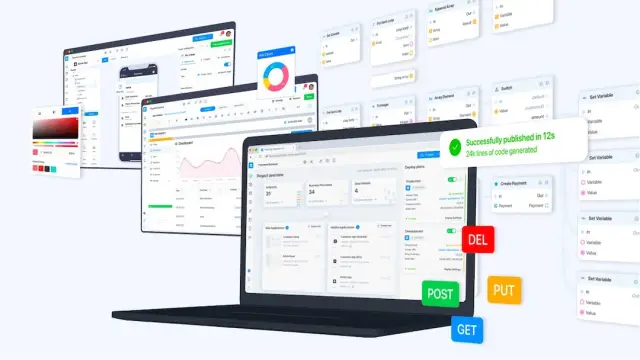No-Code Customization for Hospital Management Software
Discover how no-code customization capabilities within hospital management software streamline processes, enhance patient care, and enable a flexible, data-driven healthcare environment.

The Need for Customization in Hospital Management Software
Hospital management software supports efficient and streamlined operations, workforce management, and patient care in the ever-evolving healthcare industry. But the one-size-fits-all approach of standard software may not cater to individual healthcare organizations' unique needs and workflows. As each hospital or healthcare facility has its own requirements, adapting to a generic solution may limit the ability to address specific challenges and efficiently manage resources.
Customization in hospital management software is vital to ensure smooth operations, scalability, and compliance with regulatory standards. It enables healthcare organizations to tailor the software to fit their unique needs, addressing specific workflow challenges, and ensuring seamless integration with existing systems. Moreover, customized software helps organizations meet the needs of their patients, staff, and stakeholders better.
In the past, customization of hospital management software often required writing custom code and hiring software development teams, causing significant bureaucracy, financial burden, and system lock-in. No-code development platforms have revolutionized customization, offering a more flexible, cost-effective, and efficient alternative to traditional software development.
Advantages of No-Code Customization in Hospital Management Systems
With the advent of no-code development platforms, creating customized hospital management systems has become more accessible for healthcare organizations, eliminating the need for extensive software development knowledge and resources. By leveraging no-code customization in hospital management systems, healthcare facilities can reap numerous benefits, including:
- Streamlined Processes and Improved Efficiency: No-code customization enables the creation of hospital management software tailored to the organization's specific needs, streamlining workflows, and eliminating redundant or unnecessary processes. This results in improved efficiency, better utilization of resources, and reduced human errors.
- Enhanced Patient Care: Customization allows healthcare organizations to address specific patient needs, offering a more personalized and patient-centric approach. For example, an integrated no-code patient portal can facilitate appointment scheduling, prescription refills, and secure communication between patients and healthcare providers, thus improving patient care and satisfaction.
- Better Workforce Management: Customizable hospital management systems can help in efficient workforce management by automating and optimizing scheduling, time tracking, and payroll processes. This results in better allocation of resources, reduced workload, and improved staff satisfaction.
- Improved Financial Operations: No-code customization capabilities can streamline healthcare organizations' billing, insurance claims, and financial reporting processes. This reduces administrative overhead, ensures compliance with regional and international healthcare regulations, and optimizes revenue cycles.
- Data-Driven Decision-Making: Customized hospital management software can provide more granular and organization-specific data analytics, allowing healthcare leaders to make data-driven decisions that enhance operational efficiency and patient outcomes.
- Seamless Scalability and Flexibility: No-code customization enables healthcare organizations to scale their hospital management systems easily, adapting to changing needs and incorporating new features or functionalities as required. This offers greater flexibility and reduces the need for future software overhauls.

Key Features and Capabilities of No-Code Hospital Management Solutions
Healthcare organizations should consider key features and capabilities aligning with their needs and goals when selecting a no-code platform for customizing hospital management software. Some of the essential components for a no-code hospital management system include:
- Patient Registration and Management: No-code platforms should support creating customized patient registration and management systems, capturing relevant demographic and medical information while ensuring data privacy and compliance with healthcare regulations.
- Appointment Scheduling: A no-code solution should enable healthcare organizations to build appointment scheduling systems that cater to unique workflows, optimize resource allocation, and improve patient experience.
- Laboratory and Imaging Management: No-code platforms should facilitate the creation of customized laboratory and imaging management systems to streamline diagnostic processes, order management, and result sharing between healthcare providers and patients.
- Electronic Health Records (EHRs): Customizable no-code hospital management systems should support seamless integration with electronic health records, enabling healthcare providers to access and manage patient data electronically while maintaining compliance with data privacy regulations.
- Billing and Insurance: The capability to customize billing and insurance processes is crucial for no-code hospital management systems, ensuring accurate charge capture, timely claims submission, and efficient revenue cycle management.
- Analytics and Reporting: No-code solutions should support the development of customized analytics and reporting features to generate actionable insights from data, improving performance management and data-driven decision-making within the healthcare organization.
Choosing a no-code platform equipped with these critical features and capabilities can significantly enhance the customization process for hospital management software, enabling healthcare organizations to create tailored systems that effectively address their specific challenges and streamline operations.
Creating a Customized Hospital Management System with AppMaster
AppMaster is a powerful no-code platform that enables users to build customized backend, web, and mobile applications quickly and efficiently. With its extensive features and capabilities, healthcare organizations can develop tailored hospital management systems catering to their needs. To create a customized hospital management system with AppMaster, follow these steps:
- Define your data model: Use AppMaster's visual tools to create data models representing the main entities in your hospital management system, such as patients, doctors, appointments, and medical records. These data models essentially function as the underlying database schema for your application.
- Design business processes: Leverage AppMaster's visual Business Process (BP) Designer to create the custom business processes that define your hospital management system's logic. AppMaster allows you to automate various tasks, from appointment scheduling to billing and record-keeping, ensuring seamless operation and efficient data handling across the platform.
- Develop REST API and WSS endpoints: With AppMaster, you can automatically generate REST API and WSS endpoints for seamless integration with your existing hospital management software. This ensures your new, customized system can communicate effectively with other applications and devices within your healthcare environment.
- Build responsive interfaces: Use the drag-and-drop UI designer to create an engaging and user-friendly interface for your customized hospital management software. AppMaster allows you to easily integrate customized, visually appealing components while ensuring a consistent user experience across web and mobile applications.
- Generate and deploy applications: Once you have defined all aspects of your custom hospital management system, AppMaster automatically generates the source code for your applications and compiles them into executable binary files. The platform also provides fast deployment capabilities, allowing you to generate a new set of applications in under 30 seconds and deploy them to cloud-based or on-premises environments.
With the flexibility offered by AppMaster, healthcare organizations can easily develop and deploy customized hospital management systems. The platform eliminates the need for manual coding, reduces technical debt, and streamlines the development process, empowering healthcare providers to optimize their operations.

Real-World Applications of No-Code Patient Care Systems
No-code customization capabilities within hospital management software lead to real-world applications that positively impact patient care. Here are a few examples:
Streamlined patient intake processes
No-code hospital management systems allow healthcare providers to create a more efficient and patient-centric intake experience. By automating patient registration and leveraging visual tools, healthcare providers can reduce waiting times, minimize manual paperwork, and improve patient satisfaction.
Secure and efficient medical records management
By adopting no-code customization, healthcare organizations can ensure secure and efficient management of electronic health records. AppMaster enables organizations to design customized data collection, storage, and retrieval processes, ensuring sensitive patient information remains protected while remaining easily accessible to authorized personnel.
Automated billing and claims processing
No-code customization in hospital management systems enables healthcare providers to automate the billing and claims process, reducing errors, minimizing delays, and improving cash flow management. With a customized billing process, healthcare organizations can also enhance patient satisfaction by providing accurate, timely, and convenient payment options.
Optimized resource allocation
One of the key challenges healthcare organizations face is the efficient allocation of resources, such as medical staff, equipment, and beds. No-code hospital management systems offer scheduling and resource management features that can be customized to suit each organization's unique requirements. This results in more effective resource allocation, minimizing waste, and improving patient care.
Actionable insights for better decision-making
A no-code hospital management system facilitates data-driven decision-making by providing healthcare organizations with customized analytics and reporting tools. By leveraging these tools, healthcare providers can make informed decisions that enhance patient care, improve hospital efficiency, and optimize hospital performance.
With no-code customization capabilities, hospital management software can be tailored to meet the unique needs of healthcare organizations. Organizations can significantly improve their operations and enhance patient outcomes by embracing no-code patient care systems.
Transitioning to a No-Code Solution for Hospital Management
Transitioning from a traditional hospital management system to a no-code solution may seem overwhelming, but following a step-by-step approach can simplify the process. Here's how healthcare organizations can seamlessly transition to a no-code hospital management solution:
- Assess your current workflow: Evaluate your existing hospital management software, its shortcomings, and areas that could benefit from customization. This assessment will provide a clear understanding of your organization's requirements and enable you to prioritize improvements.
- Choose a capable no-code platform: Select a no-code development platform like AppMaster that offers the necessary features and capabilities to develop a customized hospital management system. Evaluate the platform's features, ease of use, scalability, and integration options to ensure it aligns with your organization's needs.
- Involve relevant stakeholders: Involving stakeholders such as hospital administrators, IT staff, and medical professionals during the transition process will ensure that the new no-code hospital management system aligns with end-users' requirements and expectations. This collaboration will help drive a successful transition while minimizing disruption to existing workflows.
- Develop and deploy the customized solution: Use the chosen no-code platform to design and build a customized hospital management system that addresses your organization's specific requirements. Once the development is complete, deploy the solution to your healthcare environment and monitor its performance closely.
- Provide training and support: Ensure all hospital staff members are trained on the new no-code hospital management system and have access to ongoing support resources. This will help to maximize adoption, minimize disruptions to daily operations, and drive long-term success with your new no-code solution.
Transitioning to a no-code hospital management solution doesn't have to be daunting. By following these steps and utilizing a powerful no-code platform like AppMaster, healthcare organizations can significantly improve their operational efficiency, patient care, and hospital performance.
FAQ
No-code customization refers to the ability to create, modify, and deploy hospital management software without requiring developers to write code. It allows healthcare organizations to tailor the software to their specific needs through visual tools and templates.
No-code customization can streamline processes, enhance patient care, enable better workforce management, improve financial operations, and drive data-driven decision-making in a healthcare environment, resulting in more efficient hospital management.
Key features of a no-code hospital management system include patient registration and management, appointment scheduling, laboratory and imaging management, electronic health records, billing and insurance, and analytics and reporting.
AppMaster, a powerful no-code platform, allows healthcare organizations to visually create data models, design business processes, and build REST API and WSS endpoints for hospital management systems. Users can create customized applications with drag-and-drop tools and generate real-time applications in under 30 seconds.
No-code hospital management software can be used to streamline patient intake processes, manage medical records securely and efficiently, automate billing and claims processing, optimize resource allocation, and provide actionable insights for better decision-making in healthcare organizations.
To transition to a no-code hospital management solution, healthcare organizations should assess their current workflow, identify the areas where customization can provide the most benefits, and select a no-code platform like AppMaster that offers required features and capabilities to develop tailored hospital management systems.





